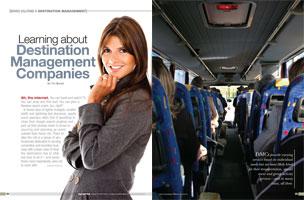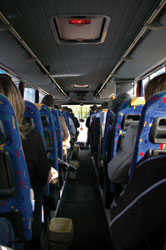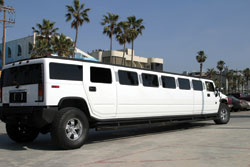
 Ah, the internet. You can bank and watch TV. You can shop and find love. You can plan a flawless sports event, too, right?
Ah, the internet. You can bank and watch TV. You can shop and find love. You can plan a flawless sports event, too, right?
In these days of tighter budgets, smaller staffs and lightning-fast decisions, sports event planners often find it beneficial to close their Google search engines and pick up their phones when it comes to sourcing and planning an event outside their home city. There to take the call is a group of professionals dedicated to serving convention and incentive business with a keen view of what the destination has to offer and how to do it - and sometimes more importantly, who not to work with.
What is a DMC?
"A destination management company (DMC) is a local service organization that provides creative itineraries, resources and logistics management based on an in-depth knowledge of their destination," said Nicole Marsh, CMP, DMCP, owner and president of Denver's The Arrangers DMC. In many cases, the owners and managers of these firms are natives to their destinations and have a long history within the community.
DMCs provide varying services based on individual needs but are most likely hired for their transportation, special event and group activity services-and in many cases, all three.
Providing transportation services is a large part of a DMC's business. Even as the economy forced some budgetary cutbacks, sports event organizers realized that you still had to move people. These services can involve managing manifests for an airport ‘meet and greet' with uniformed staff holding signage, greeting athletes and guests and escorting them to chartered vehicles, large group movements, or even specialized VIP on-call services.
 "When there's a transportation component," said Steve Schell, vice president of sales and services of the San Diego Convention and Visitors Bureau, "(we) will definitely recommend a local DMC because they are the experts that can get them from Point A to Point B." This includes knowing road closures, safe and appropriate loading and off-loading points, as well as accurate directions.
"When there's a transportation component," said Steve Schell, vice president of sales and services of the San Diego Convention and Visitors Bureau, "(we) will definitely recommend a local DMC because they are the experts that can get them from Point A to Point B." This includes knowing road closures, safe and appropriate loading and off-loading points, as well as accurate directions.
A special event can encompass venue, themed décor, food and beverage, audio-visual elements and entertainment. These could be extravagant galas or more intimate gatherings and can be hosted either onsite at the hotel or convention center or offsite at the sports venue or restaurant.
Exclusive tour programs, teambuilding and excursions make up group activities. Again, these may be onsite at the host venue or off-site on a golf course or the side of a mountain.
Marsh, who is also the president of the Association of Destination Management Executives (ADME), the industry's main promotion and education arm, said the DMC "becomes an extension of the meeting planner's team, using the company's collective expertise and relationships locally." This includes taking total responsibility for hiring vendors to produce the end product.
Lukrecija Lelong, CMP, concurs: "Our meeting planners use DMCs because they are more familiar with the local area." Lelong is a meeting planner with IEEE based in New Jersey and finds herself constantly planning multiple back-to-back meetings in different destinations worldwide.
Why use a DMC?
The reasons why planners turn to DMCs to supplement and become an extension of their team is varied. Among the most popular reasons are the creativity and protection. The event planner's contact at the DMC can trust that their position in the local industry will afford them unique opportunities not available to the general public. This would include access to private clubs and homes in the area, as well as hidden gems in the marketplace.
 |
| Transportation services can involve managing manifests for an airport 'meet and greet' with uniformed staff holding signage, greeting guests, and escorting them to chartered vehicles, large group movements, or even specialized VIP on-call services. |
DMCs also provide protection (much like insurance) for events. To protect the company and the client, DMCs will ensure that all their vendor partners are properly licensed and insured to provide the services they are hired to execute. Additionally, the DMC will assume responsibility to communicate changes and correct any errors pertaining to the event and making sure that all supplier partners are working in tandem for the success of the program.
Another popular reason to choose a DMC is for time savings. After the recent economic turmoil, many companies are opting to delay signing hotel contracts for fear of cancellation and attrition clauses, which in turn puts a squeeze on planners and vendors who have to produce an event within a small timeframe. "Using a DMC gives us more time to focus on our meetings so we don't have to spend time researching local attractions, offsite venues, different vendors..." said Lelong.
After working with the San Diego Convention & Visitors Bureau for 13 years, Schell understands the importance of recommending his customers utilize the services of a local DMC. It would "save the customer a lot of time and money" especially when they are doing an event such as a big closing party.
Indeed, to produce a closing off-site gala, a planner would need to find, request a proposal from, contract and pay for numerous services including the venue, caterer, florist, entertainer, bus company, photographer and more. With a DMC, that's one request for proposal, one point of contact, one contract and one check. "I think the biggest advantage of using a DMC," said Lelong, "is that everything is done by the same person so you only have to work with one point of contact and not 10 different ones."
The DMC will do the legwork of vetting the suppliers to ensure that they maintain proper insurance, provide exceptional service and can produce the quality product that ensures a successful event. "The vendors that they (DMCs) use are very professional and you know by using a DMC you are getting high quality service with a great reputation," added Lelong. These vendors are sub-contracted based on their given fields and the DMC will manage the whole process of bringing it together including coordinating load-in and setup times.
How much will it cost?
One of the most asked questions of DMC owners is about how they charge for their services. The typical expectation is that a percentage of the overall program costs ranging from 15-20 percent will be added to the final bill. To help offset this added cost, DMCs are able to leverage their high volume buying power with their supplier partners in an effort meet any budgetary limitations. The meetings and events industry is all about relationships and this value is expressed clearly when a local supplier or venue provides a discounted rate to a DMC that they will consistently do business with versus someone who may come to town once a year or less.
The DMC will work with the client to provide the most appropriate billing method. Popular options include a cost-plus model (where the retail cost of the event or activity is multiplied by a percentage to develop the total cost) and the package price (where an inclusive per person price is given).
How do you find a DMC?
Selecting a DMC partner to plan and execute the logistics of an event can be "one of the most critical decisions a planner makes," said Marsh. Reputable DMCs are listed on the ADME website, www.adme.org. Industry contacts and referrals are also important. Marsh recommends asking the local Convention and Visitors Bureau or hotel contacts for recommendations. Schell, from the San Diego CVB, instructs his staff to ask qualifying questions of their customers so that they can better match a DMC with the organization based on the DMCs specialties.
A DMC's corporate profile is also good to investigate. ADME encourages planners to find out the length of time the company has operated, the number of employees, and the amount of insurance held. Industry standings and affiliations are also important. Certifications to look for include Certified Meeting Professional (CMP) and Destination Management Certified Professional (DMCP) which shows a level of experience and commitment to the meetings industry. With any service, references are also recommended.

